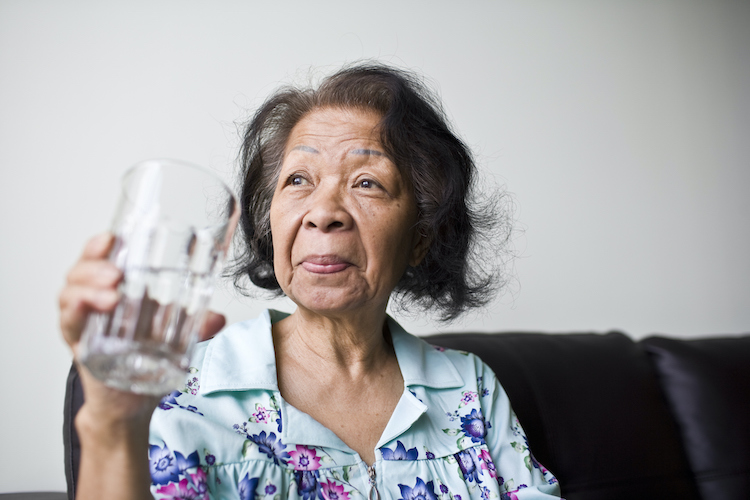
Seniors and dehydration can be a dangerous mix.
During the hottest time of year, keeping up with proper hydration is critical, especially for older adults. As a matter of fact, close to 50% of all seniors are chronically under-hydrated, as reported by a recent UCLA study, which may result in a variety of health problems, including kidney stones, urinary tract infection, and also a higher risk for falls.
The prevalence of dehydration in seniors is related to a variety of factors, such as:
- A diminished volume of water naturally occurring in older bodies
- Medication side effects
- Less sensitivity to the feeling of thirst
- A decreasing capacity to maintain an ideal fluid level balance in the body
- Diminished efficiency in the kidneys
- And more
There’s a simple calculation to figure out exactly how much water an older adult should drink each day. Take the individual’s body weight in pounds, and drink 1/3 that many ounces of water every day. Someone who weighs 120 pounds, for instance, ought to drink at the very least 40 ounces of water – about five 8-ounce glasses.
Seniors and dehydration can be a dangerous mix, and time is of the essence in ensuring proper hydration, as it is much easier to correct mild dehydration before it becomes more serious. Symptoms include:
Mild Dehydration:
- Decreased, darker-colored urine
- Dry mouth
- Dizziness and fatigue
- Muscle cramping
- Irritability
- Headaches
Severe Dehydration:
- Disorientation and confusion
- Trouble with walking
- Faint, fast pulse
- Low blood pressure levels
- Intensifying of muscle cramps
- Sunken, dry eyes
- Skin that is wrinkled and has lost elasticity
- Bloating
- Quickened breathing
- Convulsions
Seek out medical help as soon as possible if you suspect dehydration in a senior loved one, to prevent serious health complications which can develop rapidly.
In the event a senior loved one resists drinking adequate water, try flavoring the water or offering juice, if it is an appropriate part of the senior’s dietary plan. For those with conditions such as diabetes or obesity, the sugar content in juice can be dangerous. Sometimes, altering the temperature of the beverage will make it more appealing as well, such as heating up a cup of water with a little lemon to sip on each morning, and then offering cold water over crushed ice during the afternoon.
One of the keys is to have fluids available ongoing throughout the day. Geriatric nurse Anne Vanderbilt, CNS, explains, “What I often see in our advanced older adults – people in their 80s and 90s – is that they can’t sit down and drink a full 8-ounce glass of water. It fills them up, causes bloating and then makes them have to run to the bathroom. So little sips throughout the day are better.”
To help ensure the seniors you love are remaining hydrated and healthy, partner with Anthem Home Care for specialized home care in Portland and throughout the surrounding communities. Our caregivers are readily available to help monitor fluid intake, prepare healthy meals, encourage older adults to stay physically active, and more for optimal health. Email or call us at 361-643-2323 for a complimentary in-home assessment and to learn more about our home care in Portland and nearby areas! Visit our Service Area page for a full list of the communities we serve.
